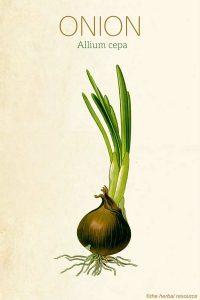The use of onion as a medicine is worldwide and the health problems it is claimed to treat are numerous. According to the World Health Organization the health problems for which onion is used as a folk remedy include: bruises, colic, ear-ache, bronchitis, colds, fevers, intestinal parasites, high blood pressure, jaundice, sores, and impotence.
Add to this list of conditions a number of others documented by the botanist James Duke in his long career in ethnobotanical research: cataracts, heart disease, burns, scabies, tuberculosis, insect stings, high cholesterol, and even varicose veins.
In addition to these uses documented in traditional medicine, this herb has also been investigated as a possible modern medicine for the treatment of diabetes, HIV and cancers.
Can the humble onion really treat all of these health problems? Some sense can be made of this voluminous list of medical conditions if they are grouped into categories corresponding to several general modes of action of medicines.
In the case of onion these are:
- anti-microbial: bacteria, viruses, fungi
- blood-thinning
- regulation of blood sugar
- anti-oxidant and/or anti-inflammatory
- other cell signal inducers or inhibitors (e.g., hormone blockers)
The fact that onion demonstrates several different modes of action is largely due to the fact that onion contains several flavonoids, notably quercetin, which has multiple biochemical properties: antibiotic and antiviral, anti-inflammatory, and cell signaling.
In addition to the flavonoids, it contains numerous organosulfur compounds and these also have medical properties.
Onion’s use as an antibiotic has been confirmed in laboratory studies showing action against some of the most common and potentially dangerous bacterial infections, including E. coli, and strains of Streptococus and Salmonella.
The antibacterial agents in the onion are believed to be natural organo-sulfur compounds, especially thiosulphate. Essential oils from onion are also active against a variety of fungal infections, including Candida. Overgrowth of this naturally occurring yeast results in problematic infections of the skin and urinary and digestive systems.
Both onion and garlic compared well with synthetic anti-fungal medicines in combating twelve different strains of Candida. However, these studies are in vitro and not clinical trials, i.e., tests on humans.
Onion extract is a known as a blood anticoagulant. The anti-clotting effect of onions and other alliums (such as garlic) is linked to their high content of organo-sulfurs. This makes it a good herbal remedy to help treat some cardiovascular conditions.
Interestingly, it appears that the anticoagulant properties do not exist in raw onion but are there in processed onion such as powders and soups. Some chemical changes might take place in drying or cooking the onion bring out the anticoagulants.
Onion’s ability to regulate blood sugar is supported by clinical evidence since the 1970s. In an Indian study of early-stage diabetic patients, those who ate more raw onion required less antidiabetic medication to manage diabetes.
What is interesting about the onion diet is that there is a beneficial lowering of blood glucose without any loss of essential blood lipids. The base of the flower (callus) rather than the bulb may, in fact, have more anti-diabetic compounds and in higher concentrations.
The field of anti-oxidant and anti-inflammatory medicine is expanding rapidly as it becomes more apparent how many diseases have inflammation signaling as their root cause. At the same time, more medicinal plants are being examined for their anti-inflammatory action.
Medicinal plants with high concentrations of anti-inflammatories, such as onion, can therefore be expected to have an effect on health problems as varied as asthma, arthritis, bronchitis, and simple allergies and rashes.
In onion, the anti-inflammatory agents identified to date are the flavonoids, specifically quercetin and kaempferol, which inhibit several inflammation-signaling enzymes and histamine. Skin allergies, as well as bronchitis brought on by allergens, have in fact been successfully treated with ethanol onion extract.
Building from earlier studies on the anti-inflammatory properties of onion compounds, cancer researchers are now looking closer at the flavonoids as well as the natural sulfur compounds in onion, and testing these for their potential to kill cancer cells.
The research focus currently is on stomach and colon cancers. Biochemists believe that the anticancer activity of onions and other alliums may be due to the chemicals that arise from the breaking down (through chopping, cooking, or dissolution) of the organosulfur compounds in the raw bulb. In particular, S-alk(en)yl cysteine sulfoxide, a free radical scavenger, is inhibiting mutation of DNA.
The antimutagenic effect of this herb is not restricted to special preparations in the lab.
A simple meal of fried onions and cherry tomatoes or fried onions alone was shown to reduce the number of damaging DNA breakages in the lymphocyte cells of healthy young women.
The precise chemical mechanism is unknown but is probably related to the antioxidant behavior of the flavonoids in onion.
Herbal Resource
Latest posts by Herbal Resource (see all)
- What is Maritime Pine Bark used for? - December 23, 2023

Leave a Reply